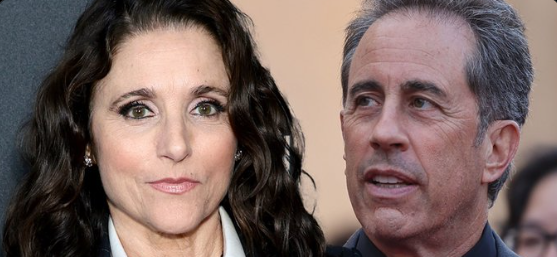Now we have yet another reason to not like this woman. Her politics are far-left, loony left perhaps.
Julia Louis-Dreyfus, renowned for her roles in “Seinfeld” and “Veep,” has expressed her disagreement with former co-star Jerry Seinfeld’s perspective on the state of comedy and the impact of political correctness. In an interview with the New York Times, Louis-Dreyfus discussed her views on how sensitivities should be considered in comedy and drama.
Julia-Louis Dreyfus says comedians complaining about political correctness is a ‘red flag’: ‘I believe being aware of certain sensitivities is not a bad thing.’ https://t.co/ydYsyhdTWY
— Entertainment Weekly (@EW) June 9, 2024
Reflecting on the evolution of comedy and drama over the past three decades, Louis-Dreyfus acknowledged that some aspects might not age well when viewed through a contemporary lens. She emphasized the importance of being sensitive to current social norms, stating, “I think to have an antenna about sensitivities is not a bad thing.” Louis-Dreyfus clarified that this awareness does not mean the end of comedy but serves as a reminder to be mindful of evolving societal values.
Contrary to Seinfeld’s criticism of political correctness, Louis-Dreyfus sees value in understanding and respecting sensitivities. She pointed out, “When I hear people starting to complain about political correctness…to me that’s a red flag because it sometimes means something else. I believe being aware of certain sensitivities is not a bad thing.” Her comments highlight a more inclusive approach to comedy, one that acknowledges the need to adapt to changing cultural landscapes.
Seinfeld, in contrast, had recently criticized what he perceives as the stifling effect of the “extreme left” on comedy. He lamented the lack of shows similar to classics like “Cheers,” “M.A.S.H.,” “The Mary Tyler Moore Show,” and “All in the Family,” attributing their absence to the pressures of political correctness. He argued that the natural feedback from live audiences helps comedians stay on track, whereas the involvement of multiple layers of approval in scriptwriting hampers creativity. Seinfeld stated, “But when you write a script, and it goes into four or five different hands, committees, groups…well, that’s the end of your comedy.”
Julia Louis-Dreyfus addresses Jerry Seinfeld’s comments about how political correctness is ruining comedy:
“I think to have an antenna about sensitivities is not a bad thing. It doesn’t mean that all comedy goes out the window as a result. When I hear people starting to complain… pic.twitter.com/htChj4D8Sx
— Film Updates (@FilmUpdates) June 9, 2024
Louis-Dreyfus also critiqued the impact of committee-based creativity but attributed the primary threat to art and comedy to the consolidation of money and power within the industry. She expressed concern over the monopolization of studios, outlets, streamers, and distributors, arguing that it stifles the creative voice. “All this siloing of studios and outlets and streamers and distributors, I don’t think it’s good for the creative voice,” she remarked.
Addressing the changing cultural landscape, Louis-Dreyfus noted that both comedy and drama are now created through a different lens. She acknowledged that even historically acclaimed films often contain attitudes that would be unacceptable today. “Even classically wonderful, indisputably great films from the past are riddled with attitudes that today would not be acceptable. So, I think it’s just good to be vigilant,” she said, underscoring the positive shift towards greater cultural sensitivity.
Regarding the classic question of whether a show like “Seinfeld” could be made today, Louis-Dreyfus pointed to the larger issue of entertainment corporatization. She argued that the unique and unconventional nature of “Seinfeld” made it stand out during its time, but today, the industry’s fear-driven environment makes it difficult for distinct ideas to gain recognition. “When ‘Seinfeld’ was made, it was really unlike anything that was on at the time. It was just a bunch of losers hanging out,” she explained, lamenting the current climate where innovation is often overshadowed by caution.
Julia Louis-Dreyfus, the star of “Seinfeld” and “Veep,” discussed comedy, political correctness, this stage of her career and more. Read her full interview with The New York Times here. https://t.co/QJtx8GHH58
— The New York Times (@nytimes) June 9, 2024
Major Points:
- Julia Louis-Dreyfus disagrees with Jerry Seinfeld’s criticism of political correctness in comedy, emphasizing the importance of sensitivity to evolving norms.
- Seinfeld blames the “extreme left” and political correctness for making comedy less prevalent on television.
- Louis-Dreyfus believes that while tolerance is essential, the bigger threat to art is the consolidation of money and power in the entertainment industry.
- She acknowledges that cultural shifts have changed how art is created and received, noting that past works often contain outdated attitudes.
- Both agree that current industry dynamics make it difficult for unique shows like “Seinfeld” to be produced today.
Charles William III – Reprinted with permission of Whatfinger News



